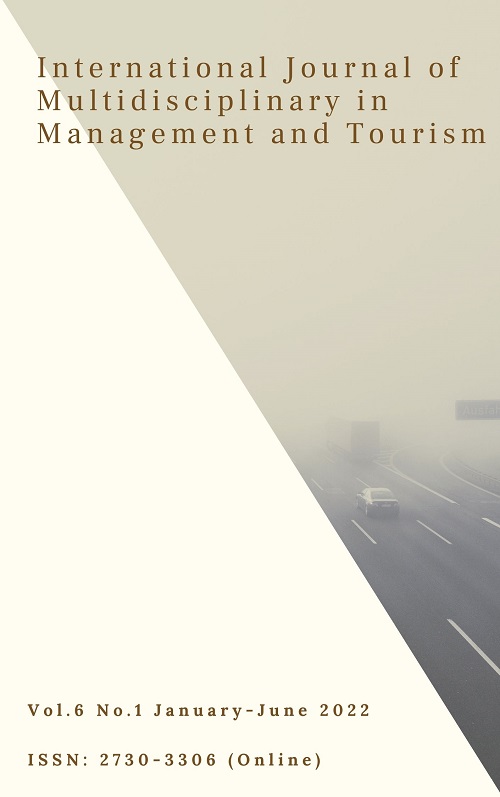A Research of Occupational Happiness of R Primary School Teachers based on JD-R Model
Main Article Content
Abstract
Tutoring activities that were previously distributed to out-of-school training institutes have been shifted to the work of in-school instructors as part of China’s “double reduction” program. As a result, teachers are under more stress than ever before, potentially affecting pupils’ education. As a result, occupational satisfaction among teachers has now been considered a critical aspect of education. The JD-R model (Job Demand-Resources) discusses the factors influencing elementary school teachers’ occupational happiness in the context of increasing job content and uneven distribution of educational resources to find effective ways to improve their occupational happiness. One hundred twenty-five staff samples were obtained from an R elementary school for the study. Result reveals that occupational, personal, organizational, and social aspects significantly affect teachers’ occupational happiness.
Article Details

This work is licensed under a Creative Commons Attribution-NonCommercial-NoDerivatives 4.0 International License.
References
Chandrasekar, A. N. (2007). An integrative job demand-resource model of burnout & job performance: A meta-analytic path analysis. Academy of Management Proceedings 1-6.
Demerouti, E., Bakker, A.B., Nachreiner, F., & Schaufeli, W. B. (2001). The job demands-resources model of burnout. Journal of Applied Psychology, 86 (3), 499-512.
Xianzuo, F., Fu, W. (2011). Performance pay reform for compulsory education teachers: background, effectiveness, problems and countermeasures: A survey of 32 counties in four central provinces. Journal of Huazhong Normal University, 6, 128-137.
Gong, C, Yunhe, L., Danni, X., & Shiyang, A. (2016). A study of status and related factors for interpersonal disturbance in primary and junior middle school teachers. Journal of Psychiatry, 5, 339-341.
Guo, Z. (2021). Teacher literacy in high quality education: Characteristics, composition and cultivation strategies. Journal of Tianjin Academy of Educational Sciences, 5, 17-22.
Hu, S. (2014). Exploring the issue of teacher participation in school decision-making. Journal of Inner Mongolia Normal University (Education Science Edition) 8, 30-32.
Jakonen, T., & Evnitskaya, N. (2020) Teacher smiles as an interactional and pedagogical resource in the classroom. Journal of Pragmatics, 163, 18-31.
Ji, C., Feng, B., & Zhao, H. (2022). How do principals' transformational leadership affect elementary and secondary school teachers' job satisfaction -The mediating role of affective commitment and the moderating role of emotional intelligence. Global Education Perspectives, 2, 93-107.
Hair, J. F., Black, B., William, B. C., Babin, B. J. & Anderson, R. E. (2014). Multivariate data analysis (7th ed.). Pearson.
Klusmann, U., Kunter, M., Trautwein, U., Ludtke, O., & Baumert, J. (2008). Teachers’ occupational well-being and quality of instruction: the important role of self-regulatory patterns. Journal of Educational Psychology, 100(3), 702-715.
Kun, A., & Gadanecz, P. (2022). Workplace happiness, well-being and their relationship with psychological capital: A study of Hungarian Teachers. Current Psychology, 41(4), 1-15.
Liu, S., Haoxiang, H., & Huang, P. (2021). A study of the relationship between learning engagement and social support among elementary and secondary school teachers. Teacher Education Research, 2, 65-71.
Ma, F., Zhang, Q., & Yang, L. (2020). A study on the mechanism of burnout among University teachers based on the job requirement-resource model: A case study of University D. Management Case Studies and Reviews, 3, 302-314.
Rahm, T., & Heise, E. (2019). Teaching happiness to teachers - development and evaluation of a training in subjective well-being. Frontiers in psychology, 10, 2703.
Rao, S. (2010). Factors influencing teachers' occupational stress and internal psychological mechanisms. Educational Academic Monthly, 7, 64-67.
Tong, X. (2014). A review of research on the academic burden of primary and secondary school students in China. Education Science Forum, 7, 73-75.
Wei, X., & Gou, W. (2021). Factors influencing elementary school teachers' occupational well-being and enhancement strategies. Popular standardization, 14, 75-77.
Wu, G. (2012). Modern educational evaluation tutorial. Beijing University Press.
Wu, G., & Xu, Y. (2015). Exploring the evaluation criteria of elementary school teachers' professional well-being. Teaching and Management, 30, 7-10.
Xie, Z., & Li, D. (2007). On the realization of teachers' self-worth. Journal of Honghe College 2, 73-76.
Xiong, B., & Li, C. (2020). A study on the mechanism of organizational support feeling on employees' happiness at work - Self-efficacy mediating role. Technology Venture Monthly, 7, 102-104.
Yang, R., Mi, L. (2008). An exploration of the appropriateness of primary school teachers' professional values and teachers' professional development. Journal of Heilongjiang College of Education, 5, 39-42.
Zhang, J. (2019). Factors influencing elementary school teachers' professional well-being and their strategies to enhance it. Contemporary Pedagogy, 7, 52-54.
Zhang, Z., & Huan, J. (2016). On the shift of the path from external shaping to internal cultivation of teachers' professional development. Journal of Hebei Normal University (Education Science Edition), 5, 80-84.

